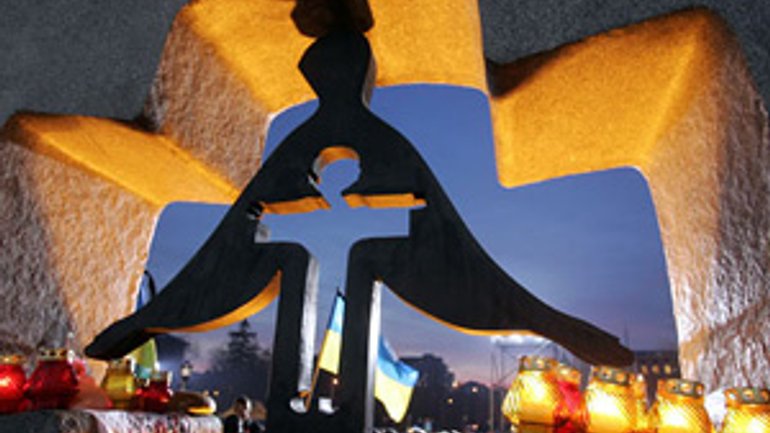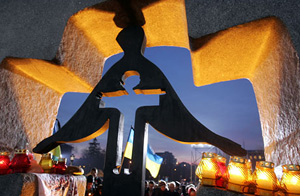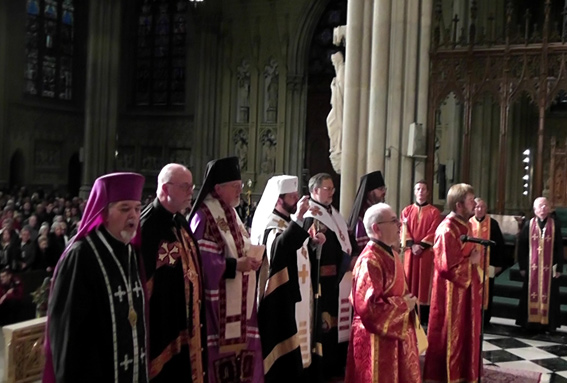Patriarch Sviatoslav Calls Holodomor Test of Cheapest Weapon of Mass Destruction

 The Ukrainian nation and the whole civilized world are still waiting for a thorough study of the genocide against Ukrainians in 1932-1933 and the dethroning of the myths about it, the head of the Ukrainian Greek Catholic Church, Patriarch Sviatoslav Shevchuk, stated during his pastoral visit to New York.
The Ukrainian nation and the whole civilized world are still waiting for a thorough study of the genocide against Ukrainians in 1932-1933 and the dethroning of the myths about it, the head of the Ukrainian Greek Catholic Church, Patriarch Sviatoslav Shevchuk, stated during his pastoral visit to New York.
He stressed that the events of 1932-1933 are still little known. According to the hierarch, not everyone in Ukraine dares to speak the truth about them. The events are often silenced for ideological and even opportunistic reasons.
The patriarch views as very positive the fact that at least now no one can deny that Ukraine, the breadbasket of Europe, went through more than one famine. “This disaster spread through the lands of Ukraine for various reasons in 1921-1923, 1932-1933, and 1945-1946. However, the great famine of 1932-1933 was one of the most horrible man-made famines, which fortunately was not experienced by other nations of the Soviet Union. Even today, it is quite difficult for us to define the exact number of the victims of the crime. According to the latest research, at least four million died in one year,” said Patriarch Sviatoslav.
The head of UGCC reminded that the artificial famine, which was organized in one of the most productive years of the fertile Ukrainian black soil, was thoroughly planned by the Soviet Union. According to the hierarch, it was a test of “the world’s cheapest weapon of mass destruction.”
According to Patriarch Sviatoslav, who referred to the eyewitnesses’ testimonies, the famine was worse than concentration camps. “A woman who experienced famine in childhood and later was a prisoner in Auswitz compared the two kinds of tortures and said that famine is a much worse thing than a concentration camp, as even in the concentration camp something was given to them to eat. All the people who miraculously survived the Holodomr unanimously state that famine is more terrible than even a war, as during a war, some people can escape, whereas there was actually no salvation from that man-made extermination,” said the hierarch.
He stressed that some people wanted to conceal the Ukrainian Holodomor, but the pain of the Ukrainian nation touched upon such deep foundations of the whole humankind that its wounds were extended far beyond the limits of one nation.
Patriarch Sviatoslav is of the opinion that famine not only ruins one’s body but “deeply wounds one’s soul, sows in it fear which paralyzes the will to resist the ideology which deprives one of freedom, and this fear is passed from generation to generation. The wounds can be healed only through memory.”
 According to him, that is why to remember about these events is important not only in order to heal the wounds of the past but also to prevent such crimes in future. That is exactly why today’s act of the memory of the Ukrainian Holodomor is important not only to Ukrainians in the United States of America and Ukraine but also to all people of goodwill: “By remembering the Ukrainian tragedy of the manmade famine we, first of all, intend to heal our memory, our wounds which still hurt us and are still bleeding.”
According to him, that is why to remember about these events is important not only in order to heal the wounds of the past but also to prevent such crimes in future. That is exactly why today’s act of the memory of the Ukrainian Holodomor is important not only to Ukrainians in the United States of America and Ukraine but also to all people of goodwill: “By remembering the Ukrainian tragedy of the manmade famine we, first of all, intend to heal our memory, our wounds which still hurt us and are still bleeding.”
At the same time, Patriarch Sviatoslav said that by remembering the Ukrainian genocide, “we are not looking for enemies on whom we would like to pour out our pain and take revenge. We are a Christian nation. This memory of ours is called by our Christian conscience which thereby seeks to announce the truth about these events to the whole world and to prevent new crimes against humanity which can be committed by any ideology,” said the head of the Church in conclusion, the Information Department of UGCC repoted.









